How to Find Freelance Writing Jobs (2024)

I’ve been a freelance writer for nearly ten years. That’s a decade of ups and downs—having a full client roster, applying to 70 gigs a day, and having ZERO clients on the books.
Today, I’m running a six-figure freelance business and managing the writing community over at Peak Freelance.
Freelance writing is a growing space. Zippia found that in the US alone, 82% of freelancers are freelance writers. There’s good money in writing, if you know where to find the right gigs.
To save you the trial and error, I put together this guide to help you figure out the most in-demand writing opportunities, the skills required, and tips on landing more freelance gigs.
How do you get into freelance writing?
Freelance writing is a super rewarding career choice.
You can work your own hours, express yourself creatively, and make good money. Hell, I’ve moved countries and haven’t kept a normal nine-to-five in years!
But, despite these awesome benefits, it also requires dedication and a strategic approach to both writing and business.
If you’re just getting into freelance writing, here’s what to do:
- Take stock of your writing abilities. Write down what areas you know best or are interested in. If you’ve worked in the tech industry, you might rock at technical writing or technology-focused content creation.
- Practice your writing. Start a blog about something you love. Posting regularly improves your writing skills and serves as a portfolio. If you’re into sustainable living, for example, start a blog about eco-friendly practices.
- Educate yourself. I started freelance writing from scratch. I don’t have a degree in journalism, communications, or English. Online courses and workshops provide enough value to start you off the right way.
- Build a portfolio. You’ll need a way to showcase your work to potential clients. Use tools like Authory or Contently to present your work online. Make a personal website, too, so you can have a digital space that you own.
- Network. Join writing groups like Peak Freelance and connect with other writers on social media. Networking opens you up to referrals. For example, a fellow writer might refer you to a project they heard about from a friend but can’t take on themselves.
Those are the basics of freelance writing. Next, you’ll want to pitch to clients. Many freelance writers (myself included) start on Upwork or Fiverr. These platforms make the job search easier and connect you with clients looking for writers. You can find remote jobs and send proposals to potential clients to land them.
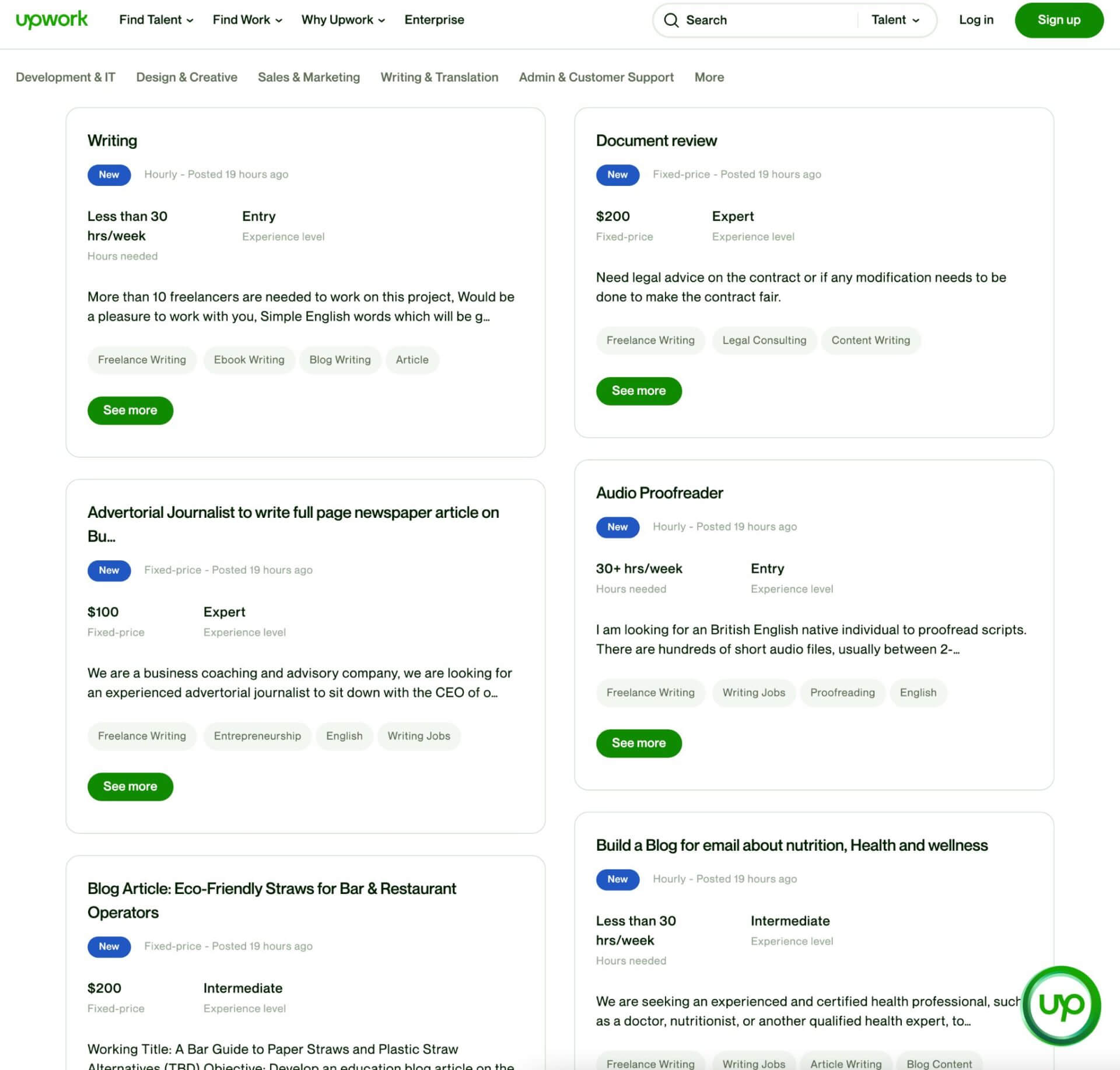
Alongside pitching on freelance marketplaces, you can also pitch directly to publications or companies. This involves finding an editor or manager’s email address and showing them why your content is worth publishing.
But what remote writing jobs are available out there on the interwebs?
Popular and in-demand freelance writing jobs
Now that you have a good idea of how to start a freelance writing business, let’s look at some of the popular jobs and the skills required for each.
Entry level
The roles below are the most common ways beginners get into freelance writing:
- Blog writing
- Social media content
- Product descriptions
- Ghostwriting
- Rewriting and editing
1. Blog writing
Think of writing cool, fun web content for websites about particular topics. You’re actually reading a blog article right now.
🏃Skills required: Strong writing and grammar skills, basic SEO and content marketing knowledge, ability to engage readers, and adaptability to different subjects or industries.
🏅 Qualifications: Although a degree in communications, English, or a related field can be helpful, it’s more important to have strong writing samples.
2. Social media content
Social content is all about coming up with those catchy posts and comments you see on Instagram, TikTok, or Facebook. The ones that make you want to click “like” or “share” right away.
You need to be witty, write in a way that catches attention, and be up-to-date with the latest internet slangs and trends.
🏃 Skills required: Strong marketing knowledge, understanding of different social media platforms, and ability to convey messages succinctly.
🏅 Qualifications: A background in marketing or communications is helpful, but experience and a history of successful social media campaigns might carry more weight.
3. Product descriptions
This role involves writing content for ecommerce brands that want to sell products online.
🏃 Skills required: Storytelling, persuasive writing, and understanding features and benefits of products.
🏅 Qualifications: No specific qualifications required.
4. Ghostwriting
A ghostwriter writes articles, books, speeches, or other texts credited to another person.
🏃 Skills required: Strong writing skills, the ability to adapt to different voices and styles, and discretion.
🏅 Qualifications: Diverse writing portfolio and references are helpful.
5. Rewriting and editing
This involves rewriting existing articles to improve them or tailor them to a different audience, and editing content for grammar, clarity, tone, and style.
🏃 Skills required: Attention to detail, understanding of different writing styles.
🏅 Qualifications: A degree in English, journalism, or a related field is helpful, as is experience with content writing and editing.
Experienced
These roles are for more experienced writers. They involve having a specialty or skill that takes time to develop:
- Copywriting
- Technical writer
- Grant writing
- Journalism
- Ebook/whitepaper
- Script writer
- Medical writer
- Legal writer
- Financial writer
6. Copywriting
Writing copy means crafting persuasive content that encourages people to take a specific action, like making a purchase, inquiring about a product, or engaging with a company.
🏃 Skills required: Persuasive writing skills, understanding of marketing strategies and consumer psychology.
🏅 Qualifications: A degree in marketing, advertising, or communications can be good for a freelance copywriter, but a solid portfolio showcasing successful campaigns is better.
7. Technical writer
A technical writer communicates complex information (like user manuals, technical specifications, and process documentation) in a clear, accessible way.
🏃 Skills required: Ability to understand and simplify complex technical concepts, communication skills, clear and concise writing style, and attention to detail.
🏅 Qualifications: Often requires a degree in a related technical field or significant experience in the industry.
8. Grant writing
This job involves writing proposals to get funding from institutions like government departments, foundations, and charities.
🏃 Skills required: Strong research skills, ability to write persuasively and descriptively, and understanding of the grant application process.
🏅 Qualifications: While there’s no specific degree required, courses in grant writing and experience in the nonprofit sector can be beneficial.
9. Journalism
These writers report on news and current events, often requiring interviews, investigation, and fast turnaround times.
🏃 Skills required: Strong research and interviewing skills, communication skills, objectivity, and ability to write under tight deadlines.
🏅 Qualifications: A degree in journalism or communications is common, though not always necessary with a strong portfolio of published articles.
10. Ebook/whitepaper
This job type involves producing detailed, authoritative reports or guides about a specific topic, often used for B2B marketing, lead generation, or establishing thought leadership.
🏃 Skills required: Deep knowledge of the subject matter, research skills, and ability to write long-form content engagingly and informatively.
🏅 Qualifications: Expertise in the subject matter is often more important than formal qualifications.
11. Script writer
These writers create scripts for TV shows, movies, commercials, or online videos, requiring a unique format and storytelling technique.
🏃 Skills required: Strong storytelling ability, understanding of script writing format, and creativity.
🏅 Qualifications: No specific qualifications required, but courses in creative writing or filmmaking and a portfolio of written scripts are helpful.
12. Medical writer
These speciality writers create content for the medical, healthcare, or pharmaceutical industries, such as research papers, drug information, and medical education materials.
🏃 Skills required: Ability to convey complex medical information clearly, strong research skills, and understanding of medical terminology.
🏅 Qualifications: Often requires a degree in a health-related field or substantial experience in healthcare.
13. Legal writer
These writers produce legal documents, contracts, and articles on legal subjects.
🏃 Skills required: Precise and clear writing, understanding of legal concepts and terminology, and strong research skills.
🏅 Qualifications: A legal background, such as a law degree or experience working in a legal environment, is typically necessary.
14. Financial writer
These writers create content related to finance, such as market analysis, personal finance advice, or explanations of economic concepts.
🏃 Skills required: Understanding of financial concepts, clarity in writing, and ability to interpret and explain complex financial reports.
🏅 Qualifications: A background in finance, such as a degree in finance or economics, is usually required.
Tips on finding and applying for freelance writing jobs
- Know your niche and strengths
- Hunt for new jobs
- Perfect your pitch
- Set a fair rate
- Negotiate your rates
- Prepare for rejection
- Continually network
- Build a portfolio
- Get active online
1. Know your niche and strengths
Writers specialize in a niche based on their expertise, passions, or backgrounds. Focusing on a specific niche helps you find clients, establish yourself as an expert, and command higher rates for your skills.
For example, the health writing market has many different segments or niches. Product writing for healthcare software would be a freelance writing niche, as would patient educational materials or academic writing for charities and organizations.
But what makes a good freelance writing niche? Here are some criteria to consider:
- Demand: How many clients in that space are looking for writers?
- Skill: What skills do you have that other people don’t?
- Talent: What do you have a natural talent for writing about?
- Budget: Can clients in that industry afford your rates?
Regardless of your niche, continue to educate yourself and deepen your knowledge to become invaluable to clients.
2. Hunt for new jobs
Job boards
Freelance job boards for writers are a good place to find freelance writing work. If you’re just starting out in freelance writing, you can use these sites to build your portfolio.
Some places to discover freelance writer jobs are:
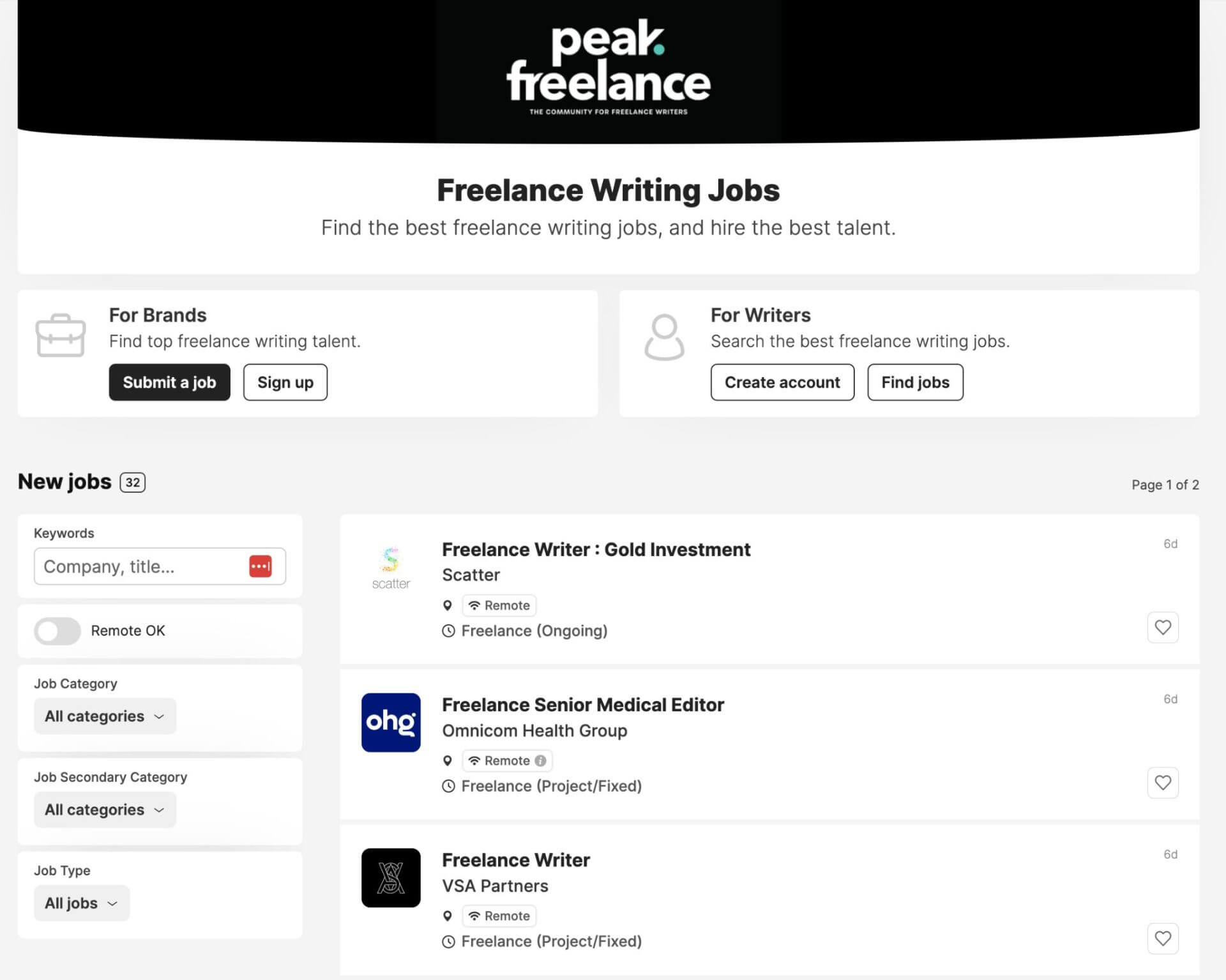
Job boards like LinkedIn also let you set job alerts, so if a job posting comes through that you’d like, you will receive an email to check it out. You can filter by job type and browse the best opportunities for your business.
Many clients posting on job boards will ask for a portfolio. So, as mentioned before, you’ll want to keep yours fresh with recent examples and current contact information.
Use your existing network
Whether you’ve just left your full-time job, or you’re building a new audience on social media, your network is a great place to find your first client.
For example, Steve Toth, founder of SEO Notebook, was once the full-time SEO Strategy Lead at FreshBooks. But he never really left the company. Instead, he turned them into a client for his freelance consulting business, SEO That Ranks.
Use your business network to build relationships and schedule discovery calls as a new freelance writer. The following tactics could be used to let them know you’re available for freelance writing:
- Sending personalized messages to your LinkedIn connections
- Emailing previous co-workers
- Tweeting about your freelance writing availability
💡FACT: Word of mouth referrals is the most common way for six-figure freelance writers to find gigs.

Content mills
Content mills aren’t a bad place to start finding clients. Over time, however, you’ll want to go out on your own to find clients. Why? It’s cheaper. Content mills take a cut of your earnings for helping you find a client.
The top content mills to try include:
3. Perfect your pitch
There are two types of pitching: cold and warm.
Cold pitching happens when you contact someone out-of-the-blue and ask them to hire you. That person doesn’t have any idea about you, nor the work you do. You’d have to make an incredible first impression to convince them to hire you. How can they trust you’ll do a good job if they’ve no idea who you are?
A warm pitch, however, means you get on a potential client’s radar before asking them to hire you. It works by finding the content manager strategist at the company you want to write for, and:
- Responding to their tweets
- Sending a LinkedIn connection request
- Commenting on their existing blog posts
- Joining their brand’s community
…before you reach out with your pitch.
Each of these tactics means your name starts to become familiar when it appears in their inbox. You’d be much more likely to open an email from someone you knew rather than a complete stranger, right? Never mind trusting someone with your money to write content for your brand.
4. Set a fair rate
Setting your rates involves a few factors, like your freelance writing experience, industry, and living expenses. I’ve tried every billing model possible (by word, by hour, per project, retainer, revenue share), and retainers have worked best for me.
Retainers are monthly fixed fees for a set amount of work. For example, your client will give you four articles every month for $2,000. It’s stable and helps you predict how much you’ll earn in a year.
To set your rates:
- Calculate your monthly living expenses, business expenses (software, subscriptions, office space, equipment, etc.), and taxes. Include your emergency savings, retirement, health insurance, and other benefits you won’t receive as a freelancer.
- Determine the annual income you want to earn. Divide this by the year’s workable hours (considering holidays, potential sick days, and vacation) to get your minimum hourly rate.
- Choose a billing model and match your hourly rate. For example, if your hourly rate is $75 and it takes you 4 hours to write an article, make sure you’re earning a minimum of $300 for your work.
Different projects may require different rates. So keep your rates flexible, understand the value you provide a client’s business, and charge accordingly.
For a benchmark, the average freelance writer charges between $250 and $399, according to a recent survey. Respondents wrote for various niches, like lifestyle, health, and more.
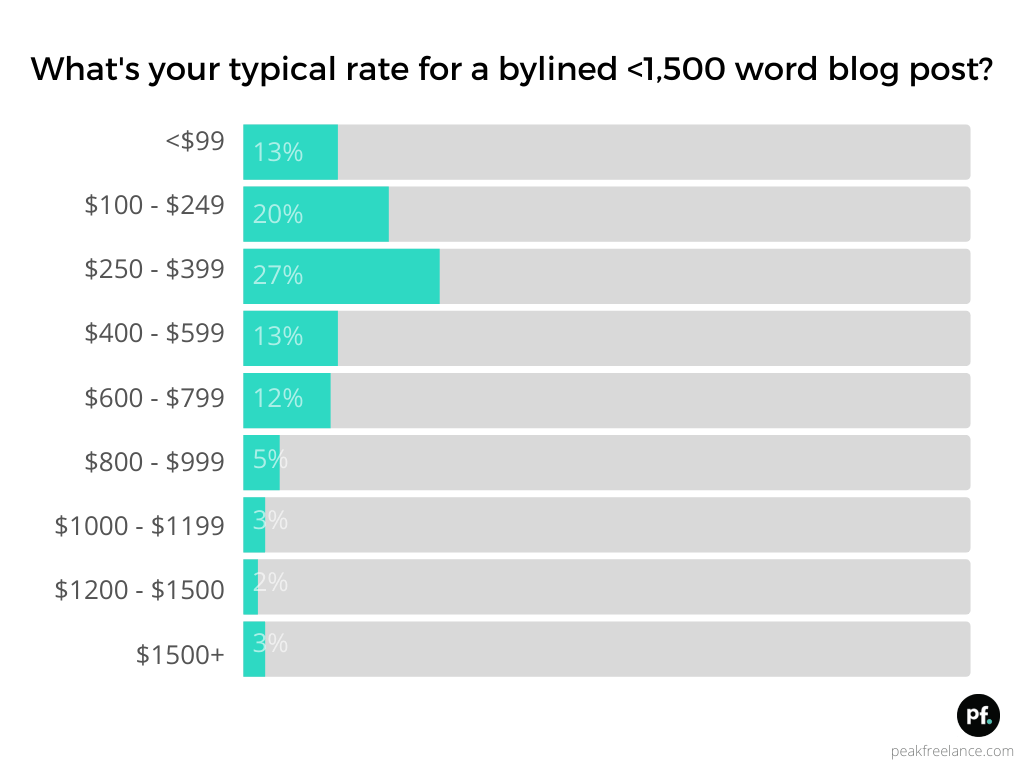
5. Negotiate your rates
Negotiating rates is a scary thing in freelance writing. But to earn a living, you need to know your worth and stand by it no matter what.
Here’s how a mentor taught me to approach rate negotiations:
- Set a minimum rate to accept. Consider your experience, skills, and unique offerings.
- Communicate value. Explain how your work can improve the client’s business. Can you get them more search traffic? Free trials? Paid conversions? Provide examples of your past work to show off your track record.
- Offer options. If a client has a smaller budget, offer to adjust the scope of work instead of lowering your rates. For example, suggest a smaller project or fewer revisions.
- Be confident. Negotiation is an art, and confidence plays a significant role. Practice your negotiation conversation, be clear on your points, and maintain a professional, calm demeanor during the discussion.
Once you’ve agreed on terms, get everything in writing. A contract or written agreement should detail the scope of work, payment terms, timelines, and any other pertinent details.
6. Prepare for rejection
Being told no is a natural part of freelancing. It can be tough to handle at first, especially when you’re excited about your work. Not every client will be a good fit for your services, and that’s okay.
Try to separate your emotions from any rejection. It’s often not about you personally, but more about the client’s specific needs, budget, or situation. If possible, ask for feedback on why you weren’t chosen, and use it to improve your skills.
If you keep a positive mindset, focus on your successes, and remember the clients who were happy with your work, you can push through any rejections.
7. Continually network
Have you heard the saying: “It’s not what you know, it’s who you know”?
Freelancing follows the same principle. Relationships are the key to gaining long-term, high-paying clients. Solid friendships with people in your niche means you’ll become the go-to person for the type of writing you do.
Make friends with other freelancers, content managers, and agency owners to build similar relationships (and sometimes find a job at the end of it) by:
- Interacting with them online
- Becoming a guest on podcasts
- Guest posting on popular publications
- Organizing coffee chats
To find your crew faster, sign up for freelancer communities like Peak Freelance and Make a Living Writing to connect with like-minded folks.
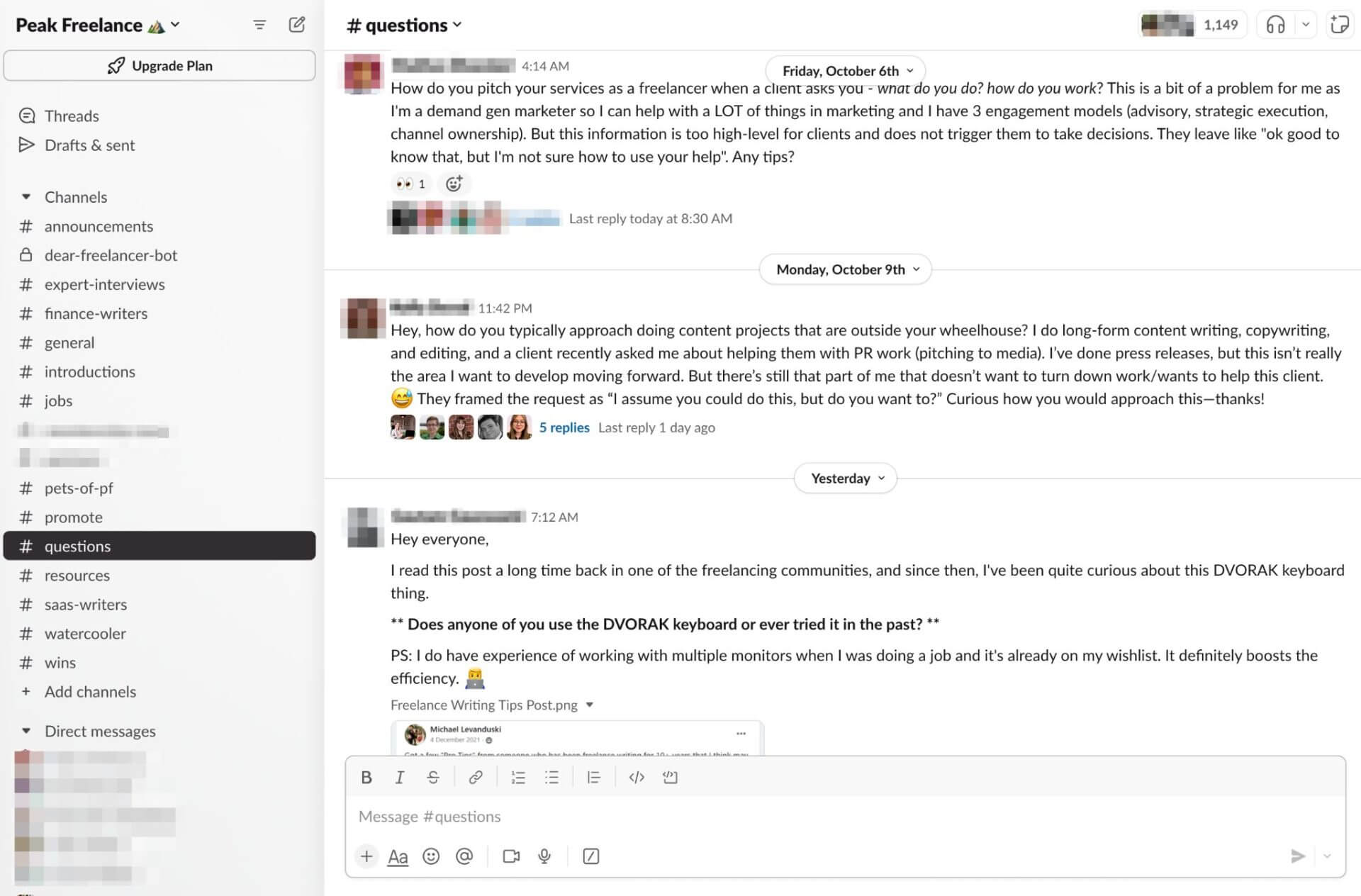
8. Build a portfolio
A writing portfolio is a collection of your work. It showcases your writing style and accomplishments.
Your portfolio is a marketing tool, attracting potential clients and setting you apart from competitors. You can put it on your freelance website (highly recommended) or use a tool like Authory, which creates a self-updated portfolio as you publish new articles.
Here’s an example of freelance writer Elise Dopson’s Authory profile. She uses it alongside her website portfolio to give clients more options to view her work online.

Examples of writing work you put in your portfolio are:
- Past online writing jobs
- Writing samples
- Guest posts
- Your own blog
- Spec work
Here’s an example from Ashley R. Cummings that shows what a great freelance writing portfolio can look like:
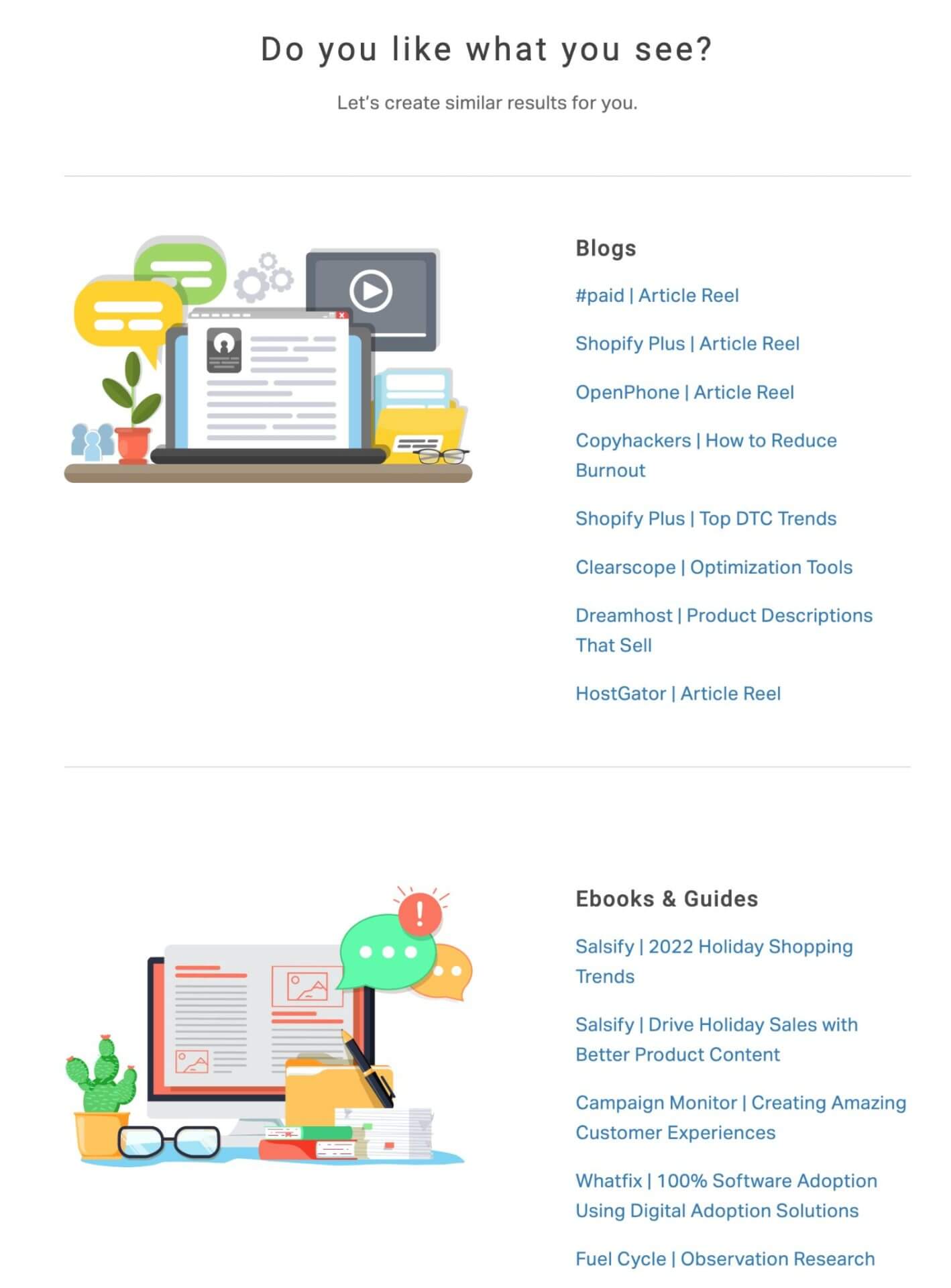
Building a writing portfolio is not only an excellent way to find new clients, but also a great way to keep track of what you’ve accomplished. Having everything in one place can be useful for doing a yearly review of your business. When job hunting, keep it updated so you can quickly and easily send it to prospective clients.
9. Get active online
Connect with colleagues in your niche, such as freelancers, content managers, and people in your industry, to start building relationships.
Here are some ways to get active on social media:
- Commenting on potential clients’ posts: Want to work with a brand like Wix or Shopify? Follow people from their content team and start liking or commenting on the stuff they publish. It doesn’t matter whether you have 5 or 500 followers, they’ll start seeing your name pop up in their notifications.
- Sharing posts: If you see an interesting post on Twitter or LinkedIn, share it. Similar to commenting, it can build awareness with potential clients and get you on their radar.
- Chatting with fellow freelancers. As a freelance writer, networking is super important to your personal growth and business development. Find freelancer friends on your preferred channels (we find Twitter particularly helpful!), and start having discussions with them. You can comment with funny GIFs, send them a DM, or invite them to a Zoom chat to discuss ideas and have a coffee chat.
- Posting original content. Another way to get noticed on social media is by posting original content. It doesn’t always need to be an article on your Medium account or website. You can also share quick tips, infographics you find, or an interesting article you think followers will like.
📚LEARN: 12 Things I Wish I Knew Before Starting My Blog
Finding online writing jobs
While it’s great that there is no short supply of online writer jobs; the flip side is that with demand comes competition.
While you no longer have to work for a publisher in New York, San Francisco, or Los Angeles to get your writing out there, there are more freelancers looking for work than ever before.
Therefore, in order to truly stand out and land high-quality projects, you need to build a credible portfolio of work and learn how to market yourself as a content writer, journalist, or content editor.
Whether you just want some extra writing gig money part-time, want to make a living writing, or become a major business journalist, your options are endless.
So, check out these best websites and tips for finding online writing and proofreading jobs, start gaining experience as a blogger, and you never know how this could grow into a writing career someday.
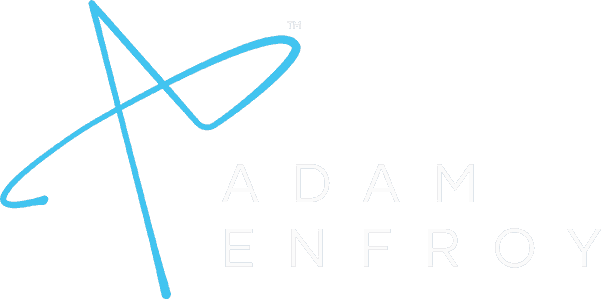




Such a amazing blog thanks for sharing this blog
Very comprehensive and informative. Thank you!
Great insights here especially during this Covid19 period, I believe the world requires more of this so as to make humanity feel each other’s presence irrespective of distance.
It’s a great source of knowledge; I think it will be helpful for a lot of people who are looking for learning more about the freelance writing jobs. Thank you very much for sharing this article was really looking forward for something like this.